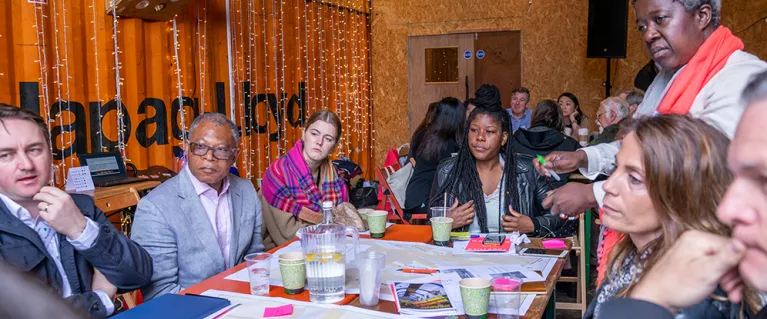
Helping London authorities deliver with a Placeshaping Capacity Survey
To deliver Good Growth local authorities need capacity to manage, create and plan built development in London. It’s not just about processing planning applications. Capacity is also needed to shape and plan good growth in local areas and communities.
Since 2014, the Mayor of London has surveyed London boroughs every two years, to see what place shaping capacity they have. The results have helped us to develop new programmes to support boroughs, such as Public Practice, and is crucial to the delivery of the Good Growth by Design programme.
This survey goes beyond asking about capacity, and also asked about design review. This reflects the fact that design review is a key part of the National Planning Framework, as well as the London Plan, and aims to ensure the quality of built schemes.
Since the publication of the 2020 survey results (which were used to support the Greater London Authority’s (GLA) response to the government’s planning white paper), the team has been in discussion with Public Practice, Homes England and Department for Levelling Up, Housing and Communities who are devising their own surveys looking at similar placeshaping needs in local authorities.
Placeshaping Capacity Survey 2024: Key insights
- Declining placeshaping capacity within borough teams
There is a consistent decrease in the average team size over time, from 88 down to 67 FTE (Full-Time Employees) roles. This suggests that boroughs are facing challenges in maintaining and growing their placeshaping capabilities, which could impact their ability to effectively plan and shape the built environment.
- Shift towards a more diverse set of placeshaping capabilities
There has been a more significant increase in roles focused on regeneration, economic development, capital delivery and property management. This shift may indicate a recognition of the need for a more diverse set of skills and expertise to address the complex challenges of placeshaping, beyond just the regulatory roles. Additionally, the slight increase in smaller, specialised teams covering areas like parks, open spaces and urban design suggests boroughs are working to develop a more diverse set of capabilities to tackle the complex challenges of placeshaping.
- Significant need for specialised sustainability-focused skills
Local authorities are currently lacking expertise in areas like digital planning, biodiversity, waste management, inclusive design and energy efficiency, which are in high demand. This highlights the growing importance of sustainability and the need for boroughs to build their capacity in these critical areas.
- Funding and resourcing constraints as primary barriers
The top-ranked barriers are all directly related to funding, including lack of available funding, uncertainty over future funding levels and difficulty in setting appropriate pay scales. These financial constraints are limiting the local authorities' capacity to staff up and develop the expertise required for effective placeshaping.
- Strategies to address capacity needs
Boroughs are prioritising retaining and upskilling existing staff, relying on temporary and contract-based workers and seeking specialised support from the GLA and cross-borough collaboration. These approaches suggest a recognition of the need to be creative and flexible in addressing their capacity challenges.
- Boroughs' preparedness and confidence
Boroughs feel better established in design-focused disciplines but less so for broader challenges. The data indicates that boroughs feel most prepared in their ability to deliver high-quality design, understand and deliver new housing typologies and apply strategic urban design/spatial planning approaches. However, they feel less prepared to address the broader economic challenges, such as the cost-of-living crisis and expected economic downturn, as well as sustainability-related issues facing their communities.
- Boroughs value GLA resources for placeshaping
The top useful resources for boroughs are the GLA's Good Growth by Design publications/programme, TfL Guidance Documents, London Plan Guidance resources and the Public Practice placement program. This suggests that the GLA is playing an important role in supporting boroughs' placeshaping efforts by providing valuable guidance, publications and access to specialised expertise.
- Widespread adoption of design review panels, a positive step forward
The data shows a significant achievement, with all but one borough now having an established design review panel in place. This widespread adoption of design review mechanisms represents an important step forward in ensuring design quality and scrutiny across London's built environment.
- Diverse Functions Tailored to Local Needs
Boroughs have specialised teams dedicated to functions like regeneration, economic development, high street management and strategic property oversight. This diversity highlights how councils take a tailored approach to serve their communities, going beyond basic statutory duties.
- Uneven Capacity Across London
Capacity is not evenly distributed, with outer boroughs having less diverse non-statutory roles to reflect their priorities compared to inner boroughs. Capacity does not necessarily align with development pressure, leaving some authorities comparatively under-resourced.
Download the Placeshaping Capacity Survey Report 2024
Need a document on this page in an accessible format?
If you use assistive technology (such as a screen reader) and need a version of a PDF or other document on this page in a more accessible format, please get in touch via our online form and tell us which format you need.
It will also help us if you tell us which assistive technology you use. We’ll consider your request and get back to you in 5 working days.